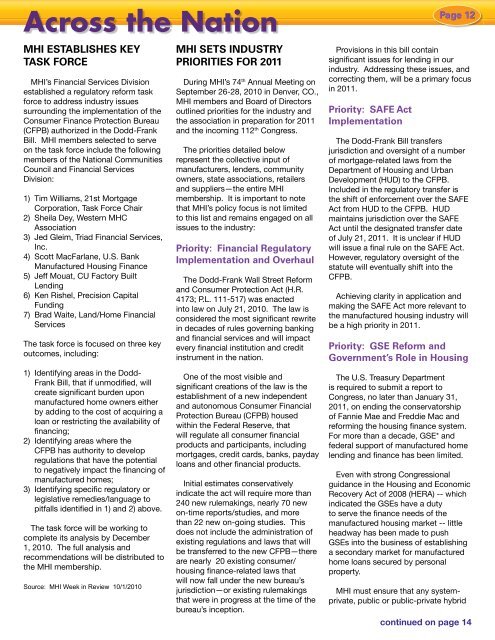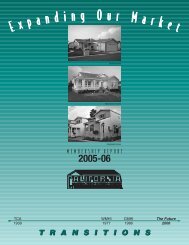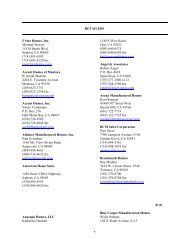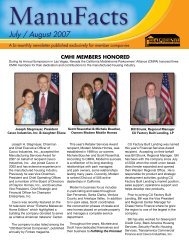A bi-monthly newsletter published exclusively for member
A bi-monthly newsletter published exclusively for member
A bi-monthly newsletter published exclusively for member
You also want an ePaper? Increase the reach of your titles
YUMPU automatically turns print PDFs into web optimized ePapers that Google loves.
Across the Nation<br />
MHI ESTABLISHES KEY<br />
TASK FORCE<br />
MHI’s Financial Services Division<br />
established a regulatory re<strong>for</strong>m task<br />
<strong>for</strong>ce to address industry issues<br />
surrounding the implementation of the<br />
Consumer Finance Protection Bureau<br />
(CFPB) authorized in the Dodd-Frank<br />
Bill. MHI <strong>member</strong>s selected to serve<br />
on the task <strong>for</strong>ce include the following<br />
<strong>member</strong>s of the National Communities<br />
Council and Financial Services<br />
Division:<br />
1) Tim Williams, 21st Mortgage<br />
Corporation, Task Force Chair<br />
2) Sheila Dey, Western MHC<br />
Association<br />
3) Jed Gleim, Triad Financial Services,<br />
Inc.<br />
4) Scott MacFarlane, U.S. Bank<br />
Manufactured Housing Finance<br />
5) Jeff Mouat, CU Factory Built<br />
Lending<br />
6) Ken Rishel, Precision Capital<br />
Funding<br />
7) Brad Waite, Land/Home Financial<br />
Services<br />
The task <strong>for</strong>ce is focused on three key<br />
outcomes, including:<br />
1) Identifying areas in the Dodd-<br />
Frank Bill, that if unmodified, will<br />
create significant burden upon<br />
manufactured home owners either<br />
by adding to the cost of acquiring a<br />
loan or restricting the availa<strong>bi</strong>lity of<br />
financing;<br />
2) Identifying areas where the<br />
CFPB has authority to develop<br />
regulations that have the potential<br />
to negatively impact the financing of<br />
manufactured homes;<br />
3) Identifying specific regulatory or<br />
legislative remedies/language to<br />
pitfalls identified in 1) and 2) above.<br />
The task <strong>for</strong>ce will be working to<br />
complete its analysis by December<br />
1, 2010. The full analysis and<br />
recommendations will be distributed to<br />
the MHI <strong>member</strong>ship.<br />
Source: MHI Week in Review 10/1/2010<br />
MHI SETS INDUSTRY<br />
PRIORITIES FOR 2011<br />
During MHI’s 74 th Annual Meeting on<br />
September 26-28, 2010 in Denver, CO.,<br />
MHI <strong>member</strong>s and Board of Directors<br />
outlined priorities <strong>for</strong> the industry and<br />
the association in preparation <strong>for</strong> 2011<br />
and the incoming 112 th Congress.<br />
The priorities detailed below<br />
represent the collective input of<br />
manufacturers, lenders, community<br />
owners, state associations, retailers<br />
and suppliers—the entire MHI<br />
<strong>member</strong>ship. It is important to note<br />
that MHI’s policy focus is not limited<br />
to this list and remains engaged on all<br />
issues to the industry:<br />
Priority: Financial Regulatory<br />
Implementation and Overhaul<br />
The Dodd-Frank Wall Street Re<strong>for</strong>m<br />
and Consumer Protection Act (H.R.<br />
4173; P.L. 111-517) was enacted<br />
into law on July 21, 2010. The law is<br />
considered the most significant rewrite<br />
in decades of rules governing banking<br />
and financial services and will impact<br />
every financial institution and credit<br />
instrument in the nation.<br />
One of the most visible and<br />
significant creations of the law is the<br />
establishment of a new independent<br />
and autonomous Consumer Financial<br />
Protection Bureau (CFPB) housed<br />
within the Federal Reserve, that<br />
will regulate all consumer financial<br />
products and participants, including<br />
mortgages, credit cards, banks, payday<br />
loans and other financial products.<br />
Initial estimates conservatively<br />
indicate the act will require more than<br />
240 new rulemakings, nearly 70 new<br />
on-time reports/studies, and more<br />
than 22 new on-going studies. This<br />
does not include the administration of<br />
existing regulations and laws that will<br />
be transferred to the new CFPB—there<br />
are nearly 20 existing consumer/<br />
housing finance-related laws that<br />
will now fall under the new bureau’s<br />
jurisdiction—or existing rulemakings<br />
that were in progress at the time of the<br />
bureau’s inception.<br />
Page 12<br />
Provisions in this <strong>bi</strong>ll contain<br />
significant issues <strong>for</strong> lending in our<br />
industry. Addressing these issues, and<br />
correcting them, will be a primary focus<br />
in 2011.<br />
Priority: SAFE Act<br />
Implementation<br />
The Dodd-Frank Bill transfers<br />
jurisdiction and oversight of a number<br />
of mortgage-related laws from the<br />
Department of Housing and Urban<br />
Development (HUD) to the CFPB.<br />
Included in the regulatory transfer is<br />
the shift of en<strong>for</strong>cement over the SAFE<br />
Act from HUD to the CFPB. HUD<br />
maintains jurisdiction over the SAFE<br />
Act until the designated transfer date<br />
of July 21, 2011. It is unclear if HUD<br />
will issue a final rule on the SAFE Act.<br />
However, regulatory oversight of the<br />
statute will eventually shift into the<br />
CFPB.<br />
Achieving clarity in application and<br />
making the SAFE Act more relevant to<br />
the manufactured housing industry will<br />
be a high priority in 2011.<br />
Priority: GSE Re<strong>for</strong>m and<br />
Government’s Role in Housing<br />
The U.S. Treasury Department<br />
is required to submit a report to<br />
Congress, no later than January 31,<br />
2011, on ending the conservatorship<br />
of Fannie Mae and Freddie Mac and<br />
re<strong>for</strong>ming the housing finance system.<br />
For more than a decade, GSE* and<br />
federal support of manufactured home<br />
lending and finance has been limited.<br />
Even with strong Congressional<br />
guidance in the Housing and Economic<br />
Recovery Act of 2008 (HERA) -- which<br />
indicated the GSEs have a duty<br />
to serve the finance needs of the<br />
manufactured housing market -- little<br />
headway has been made to push<br />
GSEs into the business of establishing<br />
a secondary market <strong>for</strong> manufactured<br />
home loans secured by personal<br />
property.<br />
MHI must ensure that any systemprivate,<br />
public or public-private hybrid<br />
continued on page 14













